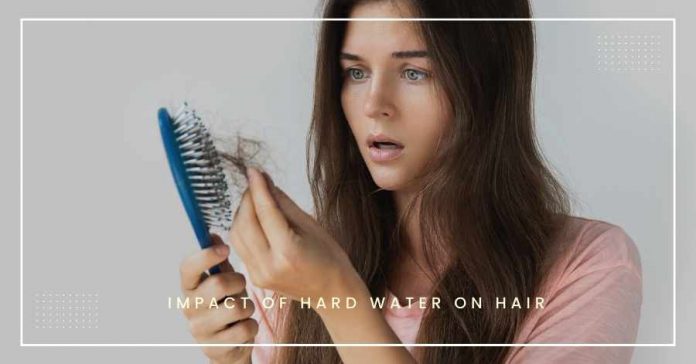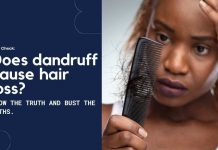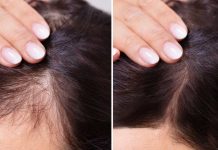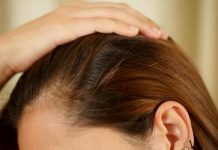Have you felt a change in your hair’s texture while travelling or after relocating to a new city? A single possible reason might be the type of water you might be using. It is tough to differentiate hard water from regular one, but the effect it has on your scalp and hair is much different. Though not a threat to your health, it impacts your scalp and hair health. Read on to know what is hard water, how it causes hair fall, its effects and ways to prevent damage.
What is Hard Water?
When discussing hard water, it is important to know it is not about how it feels or its density. The scale of hardness in water is determined by the presence of minerals in concentrated form. The higher the presence of magnesium, calcium, sodium, iron, line, or copper in water, the harder it will be[1]. So a significant question arises in your mind: Can hard water cause hair loss? What is the effect of this mineral-laced water on your tresses?
The Impact of Hard Water on Hair Texture
Have you felt your hair being extremely crunchy and dry after air drying your hair after a hair wash? This is a perfect example of how hard water messes with your mane. The crunchy and crispy feel of your hair strands is the mineral residue left behind after the water gets dried up. To understand the effect of hard water on your hair, it is first important to understand what makes it “hard”. Water’s hardness depends on the level of magnesium sulfate and calcium carbonate in it[2]. This hardness in your water is the main culprit causing brittle and dry strands. Hard water will also prevent your body washes and soaps from lathering up well.
Types of Hard Water
There are two variants of hard water. They are:
- Permanent Hard Water: Permanent hard water with sulfate salts cannot be reversed into normal water by the boiling process.
- Temporary Hard Water: If your water has a high amount of bicarbonate salts, then the hardness is removed by boiling it before using it.
Causes of Hair Fall Due to Hard Water
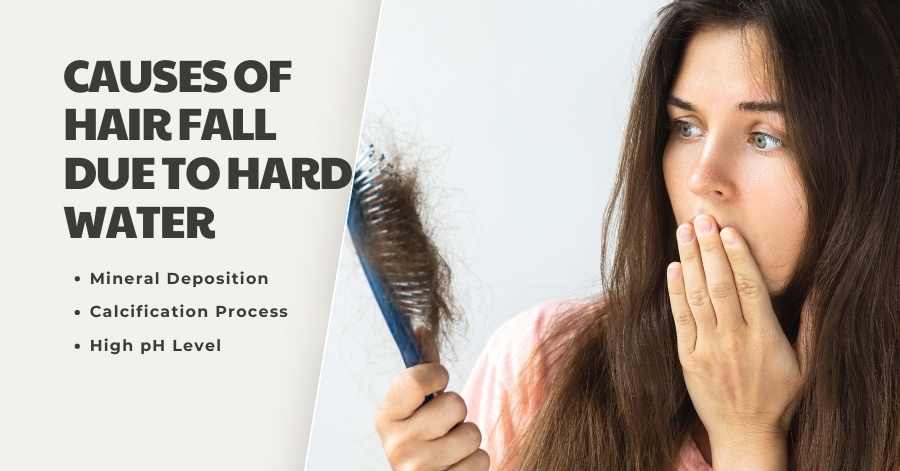
Mineral Deposition
As stated above, hard water is loaded with minerals, which is not safe for your hair’s health. These minerals open up your hair shaft to reach the cortex, which plays a vital role in maintaining the thickness, texture, and curls[3]. So, the hair loses its strength and becomes prone to breakage, leading to hair fall[4].
Calcification Process
Calcium, a main ingredient in hard water settles on the scalp in the form of soap scum. It clogs your hair follicles to inhibit hair growth. This process called calcification prevents blood circulation in hair follicles. It also leads to scalp inflammation and damages the follicles. It leads to scalp conditions like seborrheic dermatitis, psoriasis, and eczema. Despite using moisturizing products and good root strength, calcification still leads to hair loss.
High pH Level
The pH level of your scalp and hair is around 5.5 whereas the pH level of the hard water you use is over 8.5. When regularly using hard water for your hair, it increases your hair’s pH level to reach a scale of 10. This causes your cuticle to become inflamed and causing irreversible damage. It is one of the worst types of hair fall induced by hard water.
Effects of Hard Water on Hair
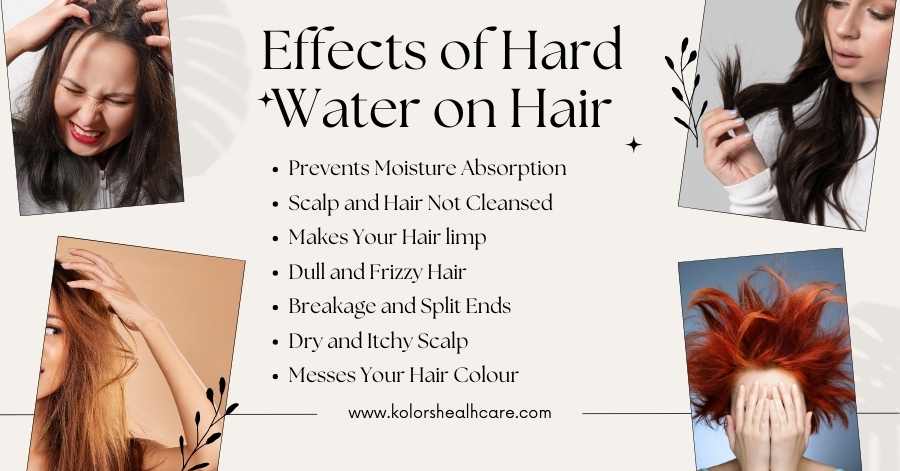
When you are using hard water to wash hairs, it leads to the accumulation of high amounts of minerals on the hair strands and scalp. This calcium and magnesium mineral build-up can have an adverse effect on your hair. This in turn might impacts your hair health negatively. The following are the various ways by which hard water affects your locks.
1. Prevents Moisture Absorption
When the minerals get accumulated on your hair and scalp due to hard water usage, it blocks your hair from locking in moisture[5]. With time, this activity of moisture blocking will have a negative impact on the overall hair health. When your hair loses moisture, it loses its sheen as well as elasticity, making it appear dull and lifeless.
2. Scalp and Hair Is Not Thoroughly Cleansed
The high amount of minerals in hard water makes it difficult to create enough lather while using shampoo. It hinders effective cleansing. You will feel a film-like coating clinging to your hair even after washing hair. A study [6] indicates that bar cleansers were ineffective while washing with hard water.
3. Makes Your Hair limp
When using hard water for washing hair, it will weigh down the tresses, making them appear limp. The mineral deposit and oil accumulation, which doesn’t get cleansed properly is a major cause behind weighing down of hair.
4. Dull and Frizzy Hair
As already discussed, hard water will prevent your scalp and hair from getting its regular dose of moisture. It can make your hair appear frizzy, dry, and dull, giving you a hard time when styling[7].
5. Increases Hair Breakage and Split Ends
When the minerals deposited on the hair strands prevent the absorption of moisture, the hair becomes dry. It in turn, causes breakage of hair strands[8]. Dry hair is always prone to split ends, as the tips don’t stay moisturized.
6. Makes Your Scalp Dry and Itchy
The blend of poor cleansing and dryness induced by hard water can make your scalp itchy. The mineral deposition in the scalp will react with the scalp skin causing irritation, flaking, and an itchy feel.
7. Messes Your Hair Colour
If you have coloured hair and use hard water, your hair colour might not last long until your next hair appointment. The minerals present in the hard water can interfere with the chemicals used for colouring hair, causing it to fade quickly.
Prevention Strategies to Avoid Hair Fall When Using Hard Water
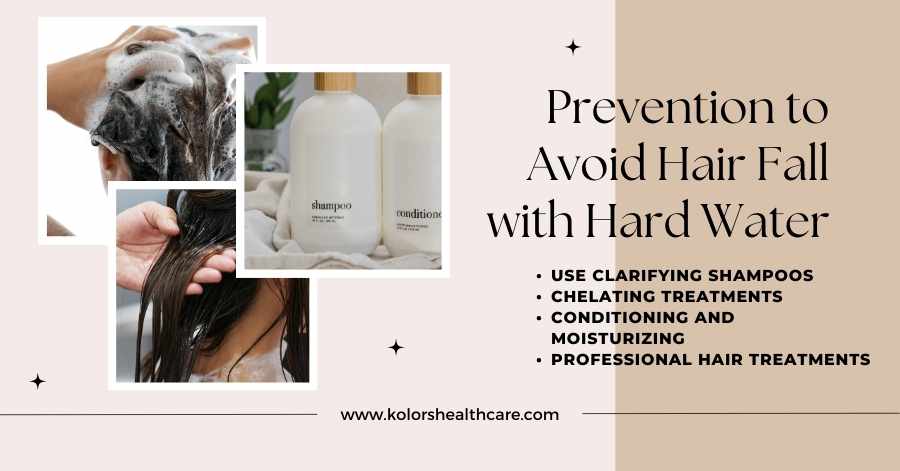
If you wish to have a healthy scalp and hair despite using hard water, it is essential to follow a few ways. These strategies can prevent damage by restoring the lost moisture, revitalizing the strands, and repairing the damage to the hair shafts.
Use Clarifying Shampoos
Bar soaps should not be in any way used for claning hairs as they leave soap scum which is difficult to remove from scalp and hairs. This becomes worst when the person is suffering from seborrheic dermatitis. On the other hand clarifying shampoos remove sebum from hair shaft and also removes the styling products like mousse, gel or hair spray. Normal shampoos even the natural ones, are not able to remove the polymer film left behind by the hair styling products. They also remove mineral build-up and other residues on your scalp. They restore hair’s natural pH level to maintain a healthy balance.
Chelating Treatments
When opting for chelating treatments, use chelating shampoos and other products that are fortified with cleansing agents to lift the mineral build-up off your mane. These treatments are formulated with chelating ingredients that bond with the minerals to clear them completely. They are a perfect choice to leave your hair strands revitalized and rejuvenated. Choose chelating products that contain effective agents like EDTA or Ethylenediaminetetraacetic acid. It targets the build-up of calcium, copper, and iron. These products are loaded with antioxidants for combating free radicals present in the scalp and hair.
Conditioning and Moisturizing
Use a leave-in hair conditioner or a moisturizing hair serum to hydrate your locks and keep dryness at bay. Choose nourishing products that have hydrating ingredients like coconut oil, avocado extracts, shea butter, argan oil, or keratin to prevent hair breakage and frizz.
Professional Hair Treatments
If all preventive measures failed to reverse damage done by hard water, consult your dermatologist for hair treatment. Your doctor will make a thorough assessment of your hair’s current condition. He will determine the severity of damage caused by using hard water. Based on the parameters and medical history, a scalp and hair examination is done to rule out other causes of hair fall. A customized hair treatment modality is created to manage the damage and stop hair loss. Approach a reputed hair clinic like Kolors Healthcare to get your personalized hair treatment for reversing hard water effects and curb hair loss.
FAQs
How to Reverse the Effects of Hard Water on Hair?
Hard water contains minerals like calcium carbonate (CaCO3) and magnesium sulfate (MgSO4). These minerals are the real cause of the impact on hair health. To nullify these effects, one could use water-softening systems or filters. Using chelating or clarifying shampoos also effectively removes mineral build-up from the hair. [Source]
Does Hard Water Cause Hair Loss?
The high mineral content of hard water, primarily calcium carbonate and magnesium sulfate, affects hair health. There is no direct evidence that links to hard water and hair loss. However, it might lead to hair weakening. Factors contributing to hair loss primarily include nutritional, genetic, and environmental aspects. [Source]
What Does Hard Water Do to Your Hair?
As explained above, the high amounts of minerals lead to a ruffled appearance of hair, increase mineral deposition, and decrease hair thickness compared to hair washed with distilled water. We know that hard water might not alter hair’s tensile strength or elasticity. It could affect its surface and thickness. One could use moisturizing conditioners and hair masks that can help counteract the potential drying effects of hard water on hair.
Final Thoughts
Understanding hard water effects on your hair and following preventive measures helps you have healthy hair that is easily manageable. From exploring chelating products, incorporating clarifying shampoo regime to trying home remedies like a vinegar rinse protects your hair. If hard water usage cannot be avoided, try using water softeners to avoid its negative impact on hair and scalp. In worst case use water from RO water purifiers to wash your hairs. Go for professional treatments offered by a reputed skin clinic like Kolors Healthcare to reverse the hard water effects on hair.
References
- Rajan Swaminathan, Pachaiyappa’s College, Chennai – https://www.researchgate.net
- Department of Dermatology, Venereology and Leprology, PSG Institute of Medical Science and Research, Coimbatore – https://www.ijtrichology.com
- Department of Dermatology, College of Medicine, King Faisal University, Hofuf, Saudi Arabia – https://pubmed.ncbi.nlm.nih.gov/28799530/
- Department of Biochemistry, Institute of Chemical Sciences, KPK, Pakistan – https://pubmed.ncbi.nlm.nih.gov/27654734/
- North Carolina Agricultural and Technical State University, Greensboro, North Carolina – https://etd.ohiolink.edu
- Department of Dermatology, Duke University School of Medicine, Durham, North Carolina, USA – https://www.ncbi.nlm.nih.gov/pmc/articles/PMC3002407/
- Department of Dermatology, PSG Institute of Medical Sciences and Research, Coimbatore, India. – https://pubmed.ncbi.nlm.nih.gov/26711619/
- Department of Biochemistry, Khyber Medical University Institute of Medical Sciences, Kohat, Pakistan – https://www.ncbi.nlm.nih.gov/pmc/articles/PMC6028999/

